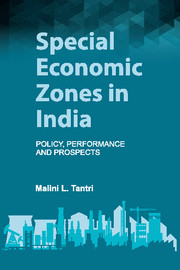Book contents
- Frontmatter
- Contents
- List of Tables, Figures, Charts and Maps
- Preface
- Acknowledgements
- Abbreviations
- 1 Introduction
- 2 Export Processing Zones to Special Economic Zones: Trajectories of Policymaking
- 3 China's Experience with Special Economic Zones under a Liberalized Regime – Highs and Lows
- 4 Performance of Special Economic Zones: Promises, Realizations and Paradoxes
- 5 An Assessment of the Fiscal Viability of Special Economic Zones
- 6 Special Economic Zones and the Question of Efficiency
- 7 Conclusions
- Bibliography
- Index
6 - Special Economic Zones and the Question of Efficiency
Published online by Cambridge University Press: 13 September 2017
- Frontmatter
- Contents
- List of Tables, Figures, Charts and Maps
- Preface
- Acknowledgements
- Abbreviations
- 1 Introduction
- 2 Export Processing Zones to Special Economic Zones: Trajectories of Policymaking
- 3 China's Experience with Special Economic Zones under a Liberalized Regime – Highs and Lows
- 4 Performance of Special Economic Zones: Promises, Realizations and Paradoxes
- 5 An Assessment of the Fiscal Viability of Special Economic Zones
- 6 Special Economic Zones and the Question of Efficiency
- 7 Conclusions
- Bibliography
- Index
Summary
Background
Ensuring efficiency in the production process of economic units is indisputably an essential component and goal of the policy. In the case of SEZs, the efficiency issues assume greater prominence considering the special attention extended to these enclaves in terms of liberalized trade, fiscal and administrative system relative to other segments of the economic system, which in turn, set a benchmark for performance standards, and more so because, these are considered the engines of growth in the trade sector. However, the literature available on the performance analysis of these enclaves based on aggregate indicators tends to overlook the possibilities that, while the performance of these enclaves might have improved in absolute terms, they might have failed in meeting the objective of improving efficiency in production processes. The failure to understand the same may result in overrating the performance of enclaves in terms of utilization of their production capacity with little scope for further improvements in their role as engines of economic growth.
To probe this issue further, let us consider the following scenario (Figure 6.1a) in which exports from these enclaves have increased almost at double digits in the year t1 (point B), as against its value in the year t (point A). This, however, does not show the corresponding increase in the exports value as the most optimum possible output, given the input mix and a special policy-based provisions exclusively available to these zones. To state otherwise, are these enclaves within the production possibility frontier (PPF) or are they at their optimum level? This scenario indicates the possibility that the figures shown to prove a substantial improvement in the performance of these enclaves might still be below the most efficient level of output. This also leaves us clueless as to whether the increase in the value of exports over the period is mainly due to a better utilization of the input mix by the existing exporting units or due to a mere increase in the number of exporting units and operational SEZs in the country or a rise in inflation. This increase in the number of exporting units and operational SEZs in the country in itself is questionable, given the apprehension that it merely amounts to a realignment of investment from domestic trade zone to SEZs.
- Type
- Chapter
- Information
- Special Economic Zones in IndiaPolicy, Performance and Prospects, pp. 135 - 147Publisher: Cambridge University PressPrint publication year: 2016



